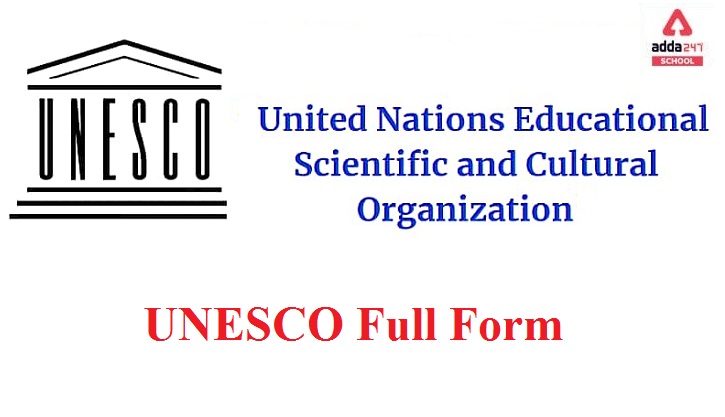Full form of UNESCO
UNESCO Full Form: The full form of the UNESCO, the abbreviation, is United Nations Educational, Scientific and Cultural Organization. The objectives of the United Nations Educational, Scientific and Cultural Organization, includes using education, science, culture, communication, and information to contribute to the creation of a culture of peace, the eradication of poverty, sustainable development, and intercultural dialogue.
UNESCO Full Form in Hindi ( UNESCO Ka Full Form )
यूनेस्को का पूर्ण रूप संयुक्त राष्ट्र शैक्षिक, वैज्ञानिक और सांस्कृतिक संगठन है। संयुक्त राष्ट्र शैक्षिक, वैज्ञानिक और सांस्कृतिक संगठन के उद्देश्यों में शिक्षा, विज्ञान, संस्कृति, संचार और सूचना का उपयोग करके शांति की संस्कृति के निर्माण में योगदान करना, गरीबी उन्मूलन, सतत विकास और अंतरसांस्कृतिक संवाद शामिल हैं।
Read About: IRS Full Form
UNESCO Full Form in English: When, Where and Why
The United Nations Educational, Scientific, and Cultural Organization (UNESCO) is a United Nations Specialist Organization. It was founded in 1946 as a result of worldwide cooperation to promote peace and stability. It achieves production, science, culture, and human rights in addition to fundamental equality. The United Nations Educational, Scientific, and Cultural Organization (UNESCO) comprises 195 member states and 9 affiliate members. Its headquarters are in Paris, France, and it also has offices in other countries. The World Heritage Center is the name of the organization’s headquarters.
UNESCO seeks to foster discourse across civilizations, cultures, and peoples based on mutual respect for common values, so that the world can attain global visions of sustainable development.
The International Committee for Intellectual Cooperation of the League of Nations was succeeded by UNESCO in 1945. The agency’s goals, governing structure, and functioning framework are all outlined in its constitution. The fundamental aim of UNESCO, which was inspired by World War II, is to promote peace, sustainable development, and human rights by facilitating international collaboration and dialogue. UNESCO funds programmes that strengthen literacy, technical training and education, science, independent media and press freedom, regional and cultural history preservation, and cultural diversity promotion.
Read About: IG of Police
United Nations Educational, Scientific and Cultural Organization
A-League of Nations decision, passed on September 21, 1921, established a Commission to study the viability of nations freely sharing their cultural, educational, and scientific achievements, which led to the establishment of UNESCO and its goal of worldwide collaboration. In 1922, Henri Bergson, Albert Einstein, Marie Curie, Robert A. Millikan, and Gonzague de Reynold founded the International Committee on Intellectual Cooperation, which included Henri Bergson, Albert Einstein, Marie Curie, Robert A. Millikan, and Gonzague de Reynold among its members. In September 1924, the International Institute for Intellectual Cooperation (ICIC) was established in Paris as the ICIC’s executing agency.
What largely disrupted the activities of these forerunner organisations, was the beginning of World War II. In terms of private initiatives, the Worldwide Bureau of Education (IBE) has been working as a non-governmental organisation in the service of international educational progress since December 1925, and after establishing a joint commission in 1952, it joined UNESCO in 2021.









 CBSE Admit Card 2026 for Private & R...
CBSE Admit Card 2026 for Private & R...
 AILET 2026 AIR 1: Check Full Toppers Lis...
AILET 2026 AIR 1: Check Full Toppers Lis...
 AILET Result 2026 OUT, How to Download S...
AILET Result 2026 OUT, How to Download S...














